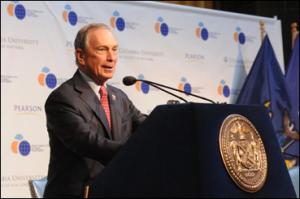Consequences of Prohibition
Drug War Issues
Politics & Advocacy
In a radio interview on WOR-AM last week, New York City Mayor Michael Bloomberg unexpectedly brought up the subject of drug legalization. Responding to a question about medical marijuana tweeted by a listener, Bloomberg seemed to realize he was stumbling into a minefield. "I'm sort of reticent to bring it up," he said, "What's up with medical marijuana in NYC," he continued, reading the question aloud. "Is it going to be okay soon? Need to know by this weekend," he read, inspiring mayoral laughter.

Mike Bloomberg
Then, apparently very much in the moment, Bloomberg turned from medical marijuana to drug legalization: "The argument is that the only way you're going to end the drug trade is to legalize drugs and take away the profit motive," he said. "And that the corruption funds enormous dislocations, like Mexico, where thousands or tens of thousands of people have been killed in the wars where the government tried to crack down on the drug dealers..."
Good start! Mayor Bloomberg, uncharacteristically for a prominent mainstream US politician, had articulated two of the core arguments made by legalization advocates. But then, perhaps realizing where he had gone politically, Bloomberg fumbled. "There is no easy answer to these things... There are places where they've legalized drugs, and whether it destroyed society or didn't is open to debate."
Actually, no country has legalized drugs. There are countries, however, that have embraced drug policies less reliant on repression via law enforcement, such as the Netherlands, with its tolerance of cannabis coffee shops and personal possession, or Portugal, which decriminalized drug possession a decade ago.
Both countries still exist and seem to have actual few ill effects as a result of their liberal approaches. The Netherlands has marijuana use rates similar to other European countries and lower than in the US. There have been problems with organized crime involvement in cultivation and supplying the cannabis cafes, but those problems are artifacts of an incomplete legalization. The Dutch liberalization does not provide for a legal supply for the cannabis cafes, thus, the so-called back door problem -- partial prohibition.
As for Portugal, Glenn Greenwald has done a comprehensive review for the Cato Institute. Bloomberg might want to read it. Greenwald found that "judged by virtually every metric, the Portuguese decriminalization framework has been a resounding success."
The experiences of both countries could hold valuable lessons for a man who presides over a city that spends $75 million a year arresting marijuana users, according to a recent report from the Drug Policy Alliance. In fact, New York city accounts to close for 10% of all marijuana possession arrests nationwide, and this in a state that has decriminalized marijuana possession. [Editor's Note: That's only possible because the NYPD has a practice of stopping and frisking young men of color and ordering them to empty their pockets, then charging them with possession in public, a misdemeanor. You do not have to empty the contents of your pockets.]
While these NYPD practices originated under Bloomberg predecessor Mayor Giuliani, whose tenure saw a quick ten-fold increase in marijuana arrests -- primarily of African Americans and Latinos -- they have continued unabated under Mayor Bloomberg. Given the understanding the mayor evidently has of prohibition, he should act to end these costly and unjustifiable policies, especially in a city undergoing a fiscal crisis, not equivocate with uninformed commentaries.
This work by StoptheDrugWar.org is licensed under Creative Commons Attribution-ShareAlike 4.0 International
Comments
Well, I'd suggest that people
Well, I'd suggest that people who object to New York's Marijuana Policies move to New Jersey as soon as that State get's it's Medical Marijuana law implemented. I know it's impractical for the people actually targeted by these policies ( the poor and ethnic), but for well to do folks, it's an option. I wonder how Bloomie would respond to his tax base moving across the river.
New York's Marijuana enforcement policies are a National embarrassment,.
this paper by hughes and
this paper by hughes and Stevens in the british journal of criminology is a superior review of the portugal experience to Greenwalds effort - its more up to date, balanced and its in a peer review journal
What Can We Learn From The Portuguese Decriminalization of Illicit Drugs?http://bjc.oxfordjournals.org/content/50/6/999.abstract
NY[k] Politiks [k]
The Mayor must have no control. The Cops are on the warpath . Who will save us? The " yes we cannabis " movement is growing @ 2% a year . 2016 ? Do the math.
Bloomberg should come clean on what he has against cannabis
He's not stupid, he must be WELL AWARE of how much violence is caused by alcohol and by cannabis prohibition, and how little violence is caused by cannabis use. He's being a bad boy by refusing to discuss alcohol vs. cannabis.
Logic and Common Sense
The U.S. can't incarcerate they way out of this problem. The U.S. has the largest prison population of any developed country. We have 5% of the worlds population and 25% of the worlds prison population.
How is marijuana prohibition different from alcohol prohibition?
What were the results of alcohol prohibition?
Tax and regulate cannabis. This would eliminate the black market and all of the problems that go with it.
The above article state that New York spent $75 million (tax payer dollars) annually on arresting cannabis users. I think there better things that money could be spent on....
Add new comment